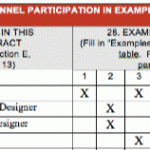
Remember that 80s commercial/infomercial about BluBlocker sunglasses? These were the glasses with the funky yellow lens. These were sunglasses so ugly that I can’t imagine anyone putting them on their face. Could you?
Yet 20 million people all over the world did just that. This was all thanks to an electrical engineer and CIA agent. But I’ll get to that in just a second.
How Difficult
First, think about this. You are selling services that your clients need. Your clients need a building, bridge, or runway. However, they can’t design and construct it themselves. Many times, these people even come to you with an RFP, a chance to propose to them.
Yet, how difficult is it to get these people to buy your services against all others? It is extremely difficult. You have a willing audience with a recognized need. But despite this, it is tremendously difficult to get them to buy from you. Let’s face it, you have a hard job.
But what if you had an audience that not only didn’t want to buy anything, but didn’t even recognize a need for what you were selling. Not only that, you had to get these people so convinced that they would call you up and just give you money without even meeting you. How much more impossible would your job be?
That’s the plight of the direct marketing copywriter. And that’s those who are successful direct marketing copywriters are so well respected.
Who Would You Learn From?
If you wanted to learn advanced copywriting tactics, who would you go to:
- The person who successfully sold to a willing audience that wanted to buy what he was selling.
OR
- The person who successfully sold to an audience that didn’t want to buy what he was selling.
I wanted to learn from the people who, against all odds, were able to convince people to buy their products and services. That’s why I read Joe Sugarman’s work. Joe Sugarman was an electrical engineer who joined the military, first working in intelligence, and eventually ended up working as a CIA agent in Germany.
Engineer = Great Copywriter?
Let me tell you, an engineer is probably the most unlikely person to become one of the greatest copywriters to ever live. But after Joe left the CIA, he did just that (I’ll let you make the connection to where he may have learned these new skills).
Joe got his start in copywriting by placing an ad in the Wall Street Journal selling a pocket calculator for $240. Keep in mind that in the early 70s pocket calculators were very new and $240 was more than $3,000 in today’s money. With the success of that ad, he started his own mail order company. He eventually went on to introduce products and concepts that are now commonplace in our world, like cordless phones, the 800 number, infomercials, etc.
One of Joe’s books, The Adweek Copywriting Handbook: The Ultimate Guide to Writing Powerful Advertising and Marketing Copy from One of America’s Top Copywriters was last month’s Get Awesome Giveaway. I wanted to give you a sense of some of the things I learned from this book.

Extreme Honesty
Joe believes that people can smell a lie, even a small lie, a million miles away. And when people smell a lie, that’s going to kill your sale. So Joe promotes extreme honesty, the kind that would make most people (especially in our industry) uncomfortable.
Let me give you an example, In one of his most famous ads, Joe takes the entire page to explain why the only reason he agreed to sell the product (a necklace) is because the manufacturer’s pretty nephew agreed to model it.
You may be thinking there is no way this ad worked. But remember, Joe didn’t go to marketing or business school like you or I. He went to engineering school, then went into military intelligence and the CIA. And this ad did work.
Nobody wants to show a chink their armor, especially architects and engineers. But by showing your imperfections, you create an environment of trust.
One of the objections you may field from an architect and engineer is “we don’t want to sound like a used-car salesman!” Ever hear that one?
But what do used car salesmen do? They only present the car in the best light. They would never tell you the car has transmission problems and the passenger-side front tire is a little flat. They would never admit a weakness. So when architects and engineers say they are “a full-service firm that is recognized as an industry leader on the cutting edge,” guess what they sound like…a used-car salesmen.
Joe would openly admit a product’s weakness, but then have an immediate response. He might say, “The front passenger-side tire is a little flat. So, we’ll replace it. Plus, we have a 10-year warranty so you won’t have to pay for flat tires in the future.” Of course, his response would be much more clever than that, but you get the idea.

Answer Every Question In The Reader’s Mind
Another one of Joe’s tactics is answering every question or objection the reader might have immediately as it pops in their head. For example, if you wrote about a batsh*t crazy ad, the reader would be wondering if it actually worked. So, you have to answer that question immediately (see how it works?).
This is a skill that will only come with practice. I certainly haven’t mastered it yet. But I think the main point is you have to actively think about the reader and the questions or objections that could potentially pop into their head. By the time the reader finishes your copy, there should be no questions or objectives left to raise.

Storytelling
People love stories. You already know this. But I’ve seen many proposals that contain no story elements whatsoever. All of Joe’s most famous and successful ads were stories about the product, how he found the product, and sometimes why he didn’t like the product (see extreme honesty).
I always try to incorporate story elements into the things I write, whether I’m writing about a train conversation with Mark Buckshon or eating kitten heads.
Those are just three advanced copywriting tactics I learned from Joe Sugarman, engineer, CIA spook, and one of the greatest copywriters to ever live.
If you liked this article, please subscribe below or on the right side of the homepage. If you want to give us your thoughts on this topic, please leave a comment below.





Excellent post. Extreme honesty is often a difficult concept to sell to decision makers who, as you note, may see it as advertising a weakness. Lies are easy to find, especially in our industry when the scope, size, value etc of our commissions are often plastered over our own websites. Backstopping is essential to ensure that what is written in proposals matches other marketing streams. Clients do check. I check myself when receding content from subconsultants. Keep the great content coming.
Solid advice. The second element on answering their questions goes back to doing the up front work. The RFP often doesn’t disclose their real questions and concerns. You have to know what those are before the RFP ever hits your desk.
Liz,
Thank you for commenting. That’s a good point.
Thanks again for the insightful and intriguing post. I agree that honesty is too often a hard sell to management. However, worded tactfully and followed up by appropriate strategies for overcoming any perceived deficiencies, clients will not only respect your candor but be won over by it.
As an aside,I have to say that Steven Tyler might be one of the very few who actually look good in BluBlockers.
Heather,
Thank you for commenting. I agree, it’s hard to pull the blublockers off. I certainly couldn’t do it. 🙂
Thanks a lot for this information. I’ll apply it and see what happens.. I hope to be one of ur winners.
Faith,
Thank you for the comment.
I always enjoy your articles and the humor you incorporate. The use of story telling definitely makes reading of technical jargon easier to follow – especially when the reader has so many proposals to sort through!
Steven Tyler is definitely one of the few who could pull off the BluBlockers – they must have been designed to look best on eccentric rockers :o)
I think they may have been. 🙂
Succinct and makes common sense seem obvious. One comment to add is the level of language, clear grammar and proof reading rather than spell checking. A good case in point is your sentence above “who would you buy from…..” You wrote “And that’s those…” Clearly this was an oversight. Read it again and you will instantly see why.
Paul,
Thank you for finding that error. I left out the word “why.”
This post is about a specific copywriter and his advice. I’m not going to add anything to this other than his advice.
Nice post. I definitely have heard “we don’t want to sound like a used-car salesman!” and I am always concerned about that. But pretty nephew? 🙂
🙂